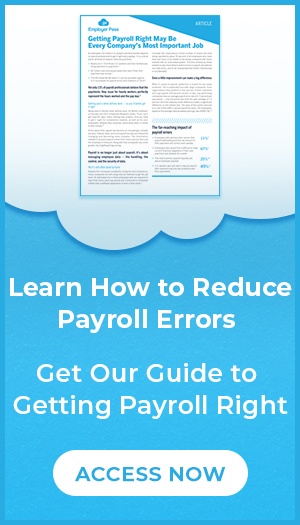by Robin Imbrogno, on Jul 1, 2022 5:59:00 PM
Employers processing payroll in Connecticut starts like payroll in most other states with determining employee pay, hours worked, overtime, any withholding or deductions, payroll tax rates, and ultimately paying employees and delivering vendor payments. Employers should be aware of final pay and lawful deductions when payments are in dispute.
Knowing what the current federal laws and Connecticut labor laws and legislation are regarding payroll is imperative right from the start.
Connecticut Minimum Wage 2024
Starting on January 1st, 2024, Connecticut's minimum wage was increased to $15.69 per hour.
In 2024 and thereafter, gradual increases will be calculated according to Federal Economic Indicators calculated by the U.S. Department of Labor (DOL).
Here is the schedule of previous Connecticut minimum wage changes based on the above state law:
- October 1, 2019 - $11.00 per hour
- September 1, 2020 - $12.00 per hour
- August 1, 2021 - $13.00 per hour
- July 1, 2022 - $14.00 per hour
- June 1, 2023 - $15.00 per hour
- January 1, 2024 - $15.69 per hour
In Connecticut, the minimum wage for minors (employees under the age of 18) is $11.05 (or 85% of the current minimum wage) for the first 200 hours of employment. However, if employed at a farm or as a government employee the 85% reduction from the current minimum wage rate can be paid indefinitely.
Connecticut employers may not pay less than the hourly minimum wage unless the employee or occupation is specifically exempt under Connecticut law or federal pay rules like the Fair Labor Standards Act (FLSA).
Connecticut Overtime Pay Law
Employers in Connecticut must adhere to both Federal and state overtime regulations defining how much overtime must be paid, and which employees are entitled to overtime pay.
Overtime exemptions or non-exempt status are set by an FLSA categorization for each employee. An employee's FLSA status will categorize the individual as "non-exempt" or "exempt" from overtime pay.
Overtime pay is granted to non-exempt employees in Connecticut who have worked over 40 hours in a workweek. These non-exempt employees are entitled to overtime pay of 1.5 times their average hourly rate for every hour worked over 40 in a single week. Time worked does not include vacation or sick time or holidays thus, such days do not count when calculating overtime.
On the other hand, exempt employees are just that, exempt from overtime pay regardless of weekly hours worked.
Connecticut Pay Period & Payroll Schedule Requirements
Connecticut payment laws require employers to pay employees on a regularly scheduled pay frequency or payday either weekly or every two weeks, which is also known as a bi-weekly pay period. If a regular payday falls on a non-workday, payment shall be made on the preceding workday.
Exceptions to these pay frequency requirements can include collective bargaining agreements, private and parochial schools, and state-aided institutions.
Connecticut Payroll Deductions
A Connecticut employer may not withhold or deduct wages from an employee’s paycheck, unless:
- The employer is required or empowered to do so by state or federal law,
- The employer has written authorization from the employee for deductions on a form approved by the Connecticut Department of Labor;
- The deductions are authorized by the employee, in writing, for medical, surgical, or hospital care or service, without financial benefit to the employer and recorded in the employer’s wage record book;
- The deductions are for contributions attributable to automatic enrollment in a retirement plan described in Section 401(k), 403(b), 408, 408A, or 457 of the Internal Revenue Code of 1986, or any subsequent corresponding internal revenue code of the United States, established by the employer.
A Connecticut employer may not deduct the following from an employee’s wages unless the employee has signed a form approved by the Connecticut Department of Labor:
- Cash shortages
- Damaged or lost property
- The cost of uniforms or necessary uniforms
- Tools or other necessary equipment
- Any similar deductions.
Connecticut Paid Family and Medical Leave (PFMLA) Deduction
As of January 1, 2021 employees are required to contribute 0.5% of their income of the first $142,800 of wages (the same as Social Security) through a mandatory payroll tax, withheld by employers, contributed to a Family and Medical Leave Insurance trust fund. This is all part of the Connecticut Paid Family Medical Leave Act (PFMLA).
Payroll is a lengthy process, but understanding Connecticut and Federal law will help make processing payroll in Connecticut much easier. Your alternative? Outsource payroll processing to an expert.
Connecticut Unemployment Tax
Connecticut employers are liable for Connecticut Unemployment Tax as well as for Federal Unemployment Tax under the Federal Unemployment Tax Act (FUTA). An employee must pay Connecticut Unemployment Tax if during the current or prior calendar year, the employer;
- Paid wages of $1,500 or more in any calendar quarter or
- Had one or more employees at work throughout 20 different weeks, whether consecutive weeks or not
Federal Unemployment Tax Act (FUTA) 2024 Rates for Connecticut
According to the U.S. Department of Labor, on November 10, 2022, Connecticut became a Federal Unemployment Tax Act (FUTA) credit reduction state (along with California, Illinois, and New York).
In 2023, employers in Connecticut had to pay an additional 0.3% in federal unemployment tax for wages paid to employees, or up to $21 in additional tax for each employee, based on the FUTA taxable wage base of $7,000, from January 1, 2023, through December 31, 2023, due to the FUTA credit rate reduction caused by an outstanding loan balance before November 10, 2022.
However, since Connecticut repaid its outstanding loan advances before November 10, 2023, employers in Connecticut will not be subject to FUTA credit reduction in 2024.
Connecticut Unemployment 2024 Rates
For the 2023 calendar year, the Connecticut unemployment tax rate is reduced by 0.2% to mitigate the impact of the Federal Unemployment Tax Act (FUTA) increase for CT employers, according to the Public Act 22-118.
For 2024, there are some key changes for CT SUTA:
- Taxable Wage Base - CT's taxable wage base (cap on earnings subject to SUTA taxes) will see a significant increase from $15,000 to $25,000.
- Rate Adjustments - CT is decreasing the minimum charged rate from 0.5% to 0.1%. However, on the opposite end, the maximum charged rate will increase from 5.4% to 10.0%, nearly doubling.
- Indexing on Inflation - Moving forward from 2024, CT will index its taxable wage base annually to account for inflation, aiming to shift in-line with economic changes.
Connecticut Income Tax Withholding
Only seven states still don’t have income withholding tax - Alaska, Florida, Nevada, South Dakota, Texas, Washington, and Wyoming. Connecticut, however, does have a state income tax which is 6.99%. Income tax withholding is the money an employer withholds from each employee's wages to help prepay the state income tax of the employee.
An employer must withhold Connecticut tax if the employee is a resident of Connecticut, performing services in the state. Wages of a nonresident are subject to Connecticut income tax withholding if the wages are paid for services performed in Connecticut. The employer remits the withholding to the state and will issue the employee a W-2 statement indicating the amount of state income tax withheld for the employee.
Social Security Payroll Taxes
Social Security tax is the tax levied on both employers and employees to fund the Social Security program. Social Security tax is collected in the form of a payroll tax mandated by the Federal Insurance Contributions Act (FICA) or a self-employment tax mandated by the Self-Employed Contributions Act (SECA).
On October 12, 2023, the Social Security Administration (SSA) announced that the maximum earnings subject to the Social Security payroll tax will increase by 3.2 percent to $168,600 beginning in January 2024. This most recent increase follows an 8.7% increase to $160,200 in 2023.
The tax rate for Social Security or OASDI at 6.20% (or more commonly viewed as a combined rate of 7.65% when coupled with Medicare), however, remains unchanged for 2024. For the self-employed, the OASDI rate also remains unchanged at 12.40% (with a combined rate of 15.30%).
Federal 401(k) Limit
In October 2023, the IRS announced changes to 401(k) limits and planning. Changes were made to the amount individuals may contribute to their 401(k) starting in 2024. Now, employees may contribute up to $23,000, up from $22,500 in 2023.
The contribution limit applies for employees participating in 401(k)s, 403(b)s, most 457 plans, and Thrift Savings Plans.
Income ranges also increased for determining eligibility for traditional Individual Retirement Arrangements (IRAs), Roth IRAs, and to claim the Saver's Credit. These ranges are referred to as 401(k) eligibility "phase-out" ranges.
Connecticut Salary Disclosure
On October 1st, 2021, the Connecticut Salary Range Disclosure Law became effective, putting into place new provisions regarding the disclosure of salary ranges and wages, as well as an update to the Connecticut wage discrimination law. These updates were made in an attempt to help limit wage and salary discrimination throughout the state.
Connecticut Final Pay Rule
Under Connecticut Gen. Stat. Ann. § 31-71c, an employer must issue a final paycheck to a terminated employee no later than the following business day. However, an employee who quits his or her job is not entitled to a final paycheck until the next regularly scheduled pay date.





